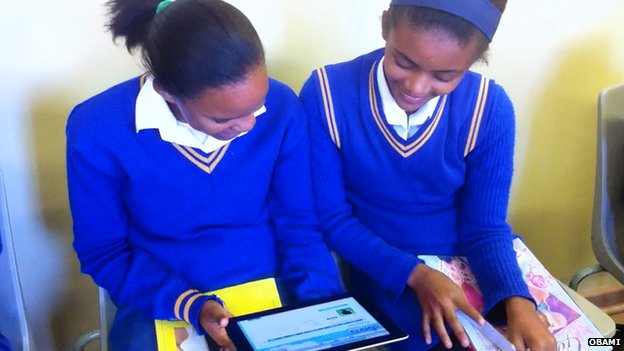In Africa’s schools, old-fashioned, dusty textbooks are gradually being replaced by tablets, computers and mobile phones.
Such digital technologies offer the potential to tackle some of the continent’s chronic education challenges, including overcrowded classrooms, teacher shortages and the 30 million children in sub-Saharan Africa without any education at all.
As Africa becomes ever more connected, educators and publishers are finding new ways to reach young audiences and develop their burgeoning minds.
One such company is Via Afrika Publishers.
First and foremost a publisher of textbooks for over 65 years, Via Afrika began to investigate the move to digital content several years ago. Its early adoption seems to be reaping dividends.
“We decided about three years ago, after looking at what was taking place in the world, that e-learning was an important direction to go in,” says Michael Goodman, the company’s group content manager.
“We decided to design a set of e-learning books that matched our printed books and indeed matched the books we submitted to the education department. It was a sort of ‘build it and they will come’ mentality, because there was no call for any electronic books to be submitted,” he added.
Mr Goodman points out that uptake has really mushroomed over the past year. While there were about 1,000 e-book sales in 2013, there have already been 64,000 in 2014, he says.
But he admits that as the South African government has invested heavily in printed materials, a widespread shift towards e-learning will require partnerships between private enterprise and government.
“We are seeing pockets of co-operation,” he says. “Companies are coming up with their own initiatives in supplying tablets and then co-operating with government to implement them in schools.
“That needs to grow a whole lot. We feel that a very strong public and private partnership is needed to move us towards e-learning completely.”
Digital containers
Via Afrika has formed just such a partnership with a non-profit organisation, Breadline Africa, to provide rural communities with digital education centres.
Breadline Africa is a Cape Town-based non-governmental organisation (NGO) that specialises in converting old shipping containers for community use.
The digital centres are being developed inside existing libraries and each is supplied with 15 Android tablet devices loaded with Via Afrika’s latest educational programmes, apps and electronic textbooks.
The Via Afrika Digital Education Centre initiative is currently being rolled out in three primary schools in the provinces of Limpopo, Mpumalanga, and the Free State.
“I visited one school last week in Limpopo and to see how the kids have responded so positively in working with brand new media has been remarkable,” says Mr Goodman.
“It’s going to be interesting for us to see what the impact will be in a small rural school.”
One of the challenges is educating the teachers as well as the children. So the centres will receive regular visits and updates to keep the educators aware of the latest developments, says Mr Goodman.
Social learning
Look around one of these centres and you will see people consuming content and interacting online in a variety of social networking spaces.
One such space is social learning platform Obami.com. The Cape Town-based firm is making waves with its brand of educational tools and online connections.
Founded by Barbara Mallinson in 2007, Obami – which means “my” or “mine” in isiZulu – began as a generic social networking site.
But Ms Mallinson soon saw the opportunity to refine the concept and have an impact upon a key issue in South Africa – education.
“We are all very aware of the education crisis going on in South Africa and beyond. Social media was being used in entertainment and for business but no-one was really doing this in education,” she explains.
Ms Mallinson and the Obami team wanted to see how social media in schools could be used to connect scholars, teachers and parents.
The first pilot study “went wonderfully”, she says, although the teachers remained wary of social networking for social networking’s sake.

“We looked at it again and thought social networking is very useful in many industries but it has to serve a purpose, and so we decided to change a few things and ended up with this idea of social media being applied to a learning management system.”
This means uploading and sharing content, and setting and undertaking assignments, she explains. Sharing curriculum content online and monitoring learners through assessment were core principles “bringing the platform to life”.
Online content
Over the past few years, Obami has continued to grow across South Africa and the continent with about 400 schools and organisations now using the platform to connect learners and partners.
As the platform is customisable it is equally suitable for an early stage learner as for an adult involved in distance learning, the company believes. It is accessible via PC, tablet or phone.
“Obami was traditionally a primary and secondary platform but we have now opened it up beyond schools,” she says.
“We also found a demand from scholars whose schools weren’t using the platform to get on to Obami, so we started our own school of sorts and now have nearly 4,000 individuals on the platform who can access its learning capabilities and content.”
Few believe technology for its own sake will be the knight in shining armour that helps South Africa and the continent educate its youth more effectively.
But used strategically by educators, publishers and government working in partnership, it has the potential to achieve great things. And fast.
----------
If you liked this article, please subscribe to our YouTube Channel for tech news, reviews and video tutorials. You can also find us on Twitter, Instagram and Facebook.






